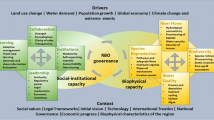Abstract
The Klamath River Basin of south-central Oregon and northern California has been the locus of historic conflict over the governance of water situated at the spiritual, cultural, and economic confluence of fishing and farming livelihoods. In recent years, a series of crises have impacted communities and stakeholder groups across the basin and jeopardized the continued existence of endangered and threatened fish species as well as the dominant economic and social relations in the basin. From these crises, however, a set of human-driven processes emerged that closely resemble the seeds of adaptive environmental governance. This chapter describes social-ecological system structures and dynamics that led to this potential emergence of adaptive governance in the Klamath River Basin. The major aim of this chapter is to critically evaluate the role of law in the basin as a tool for both creating disturbances and opening windows of opportunity through which adaptive processes could emerge. The major insight from the Klamath case is that the distribution and application of political power cannot be underestimated as either a barrier or facilitator of adaptive governance. Without an explicit recognition and analysis of power dynamics, adaptive governance scholarship lacks a critical lens to interrogate the contexts of governance transitions and evaluate the potential for new arrangements to attain explicit goals such as the sustainability of ecosystem services, the fair allocation of resources, and other principles of good governance that promote social and environmental justice.
Access this chapter
Tax calculation will be finalised at checkout
Purchases are for personal use only
Similar content being viewed by others
References
California Department of Fish and Game (2004) Klamath river Fish-Kill: final analysis of contributing factors and impacts. The Resources Agency, California. http://www.pcffa.org/KlamFishKillFactorsDFGReport.pdf. Accessed 16 Apr 2014
Chaffin BC (2014) Reallocating resources, rebuilding community: the Klamath Basin agreements and the emergence of adaptive governance. Dissertation, Oregon State University
Chaffin BC, Gunderson LH (2016) Emergence, institutionalization and renewal: rhythms of adaptive governance in complex social-ecological systems. J Environ Manag 165:81–87
Chaffin B, Craig RK, Gosnell H (2014) Resilience, adaptation, and transformation in the Klamath River Basin social-ecological system. Idaho Law Rev 51:157–193
Chaffin BC, Garmestani AS, Gosnell H, Craig RK (2016a) Institutional networks and adaptive water governance in the Klamath River Basin, USA. Environ Sci Pol 57:112–121
Chaffin BC, Garmestani AS, Gunderson LH, Benson MH, Angeler DG, Arnold CA, Cosens B, Craig RK, Ruhl JB, Allen CR (2016b) Transformative environmental governance. Annu Rev Environ Resour 41:399–423
Cosens BA, Craig RK, Hirsch S, Arnold CA, Benson MH, DeCaro DA, Garmestani AS, Gosnell H, Ruhl JB, Schlager E (2017) The role of law in adaptive governance. Ecol Soc 22(1):30. https://doi.org/10.5751/es-08731-220130
Craig RK, Garmestani AS, Allen CR, Arnold CA, Birgé H, DeCaro DA, Fremier AK, Gosnell H, Schlager E (2017) Balancing stability and flexibility in adaptive governance: an analysis of tools available in U.S. environmental law. Ecol Soc 22(2):3. https://doi.org/10.5751/es-08983-220203
DeCaro DA, Chaffin BC, Schlager E, Garmestani AS, Ruhl JB (2017a) Legal and institutional foundations of adaptive environmental governance. Ecol Soc 22(1):32. https://doi.org/10.5751/es-09036-220132
DeCaro DA, Arnold C.A.T, Boamah EF, Garmestani AS (2017b) Understanding and applying principles of social cognition and decision making in adaptive environmental governance. Ecol Soc 22(1):33. https://doi.org/10.5751/es-09154-220133
Doremus H, Tarlock AD (2008) Water war in the Klamath Basin: macho law, combat biology, and dirty politics. Island Press, Washington, DC
Gosnell H, Kelly EC (2010) Peace on the river? Social-ecological restoration and large dam removal in the Klamath basin, USA. Water Altern 3:361–383
Gosnell H, Chaffin BC, Arnold CA, Craig RK, Benson MH, Devenish A (2017) From detonator to stabilizer: rethinking the role of the Endangered Species Act’s Section 7 consultation process in social-ecological system dynamics. Ecol Soc 22(1). https://doi.org/10.5751/es-05116-170428
Klamath Hydroelectric Settlement Agreement (2016) United States Department of Interior. https://www.doi.gov/sites/doi.gov/files/uploads/FINAL%20KHSA%20PDF.pdf. Accessed 2 June 2017
Messier JY (2012) Conflict in the Klamath watershed and a relationship-building framework for conflict transformation. Dissertation, George Mason University
Most S (2006) River of renewal: myth & history in the Klamath Basin. Oregon State University Press, Portland
National Research Council (2004) Endangered and threatened fishes in the Klamath River Basin: causes of decline and strategies for recovery. The National Academies Press, Washington, DC
Sheldon KM, Elliot AJ, Kim Y, Kasser T (2001) What is satisfying about satisfying events? Testing 10 candidate psychological needs. J Pers Soc Psychol 80(2):325–339
Turner MD (2013) Political ecology I: an alliance with resilience? Prog Hum Geogr 38(4):616–623. https://doi.org/10.1177/0309132513502770
Tyler TR (2006) Psychological perspectives on legitimacy and legitimization. Annu Rev Psychol 57:375–400
Wilson RM (2010) Seeking refuge: birds and landscapes of the pacific flyway. University of Washington Press, Seattle
Judicial Opinions
Arizona v. California, 373 U.S. 546 (1963)
United States v. Adair, 478 F. Supp. 336, 345 (D. Or. 1979)
United States v. Adair, 723 F. 2d 1394 (9th Cir. 1983)
Oregon v. United States, 467 U.S. 1252 (1984)
United States v. Adair, 187 F. Supp. 2d 1273 (D. Or. 2002)
Winters v. United States, 207 U.S. 564 (1908)
Acknowledgments
This work was developed in part under the Adaptive Water Governance Project, funded by the US National Socio-Environmental Synthesis Center (SESYNC) under funding from the US National Science Foundation, NSF DBI-1052875.
Author information
Authors and Affiliations
Corresponding author
Editor information
Editors and Affiliations
Rights and permissions
Copyright information
© 2018 Springer International Publishing AG, part of Springer Nature
About this chapter
Cite this chapter
Chaffin, B.C., Gosnell, H., Craig, R.K. (2018). The Emergence of Adaptive Governance in the Klamath River Basin. In: Cosens, B., Gunderson, L. (eds) Practical Panarchy for Adaptive Water Governance. Springer, Cham. https://doi.org/10.1007/978-3-319-72472-0_6
Download citation
DOI: https://doi.org/10.1007/978-3-319-72472-0_6
Published:
Publisher Name: Springer, Cham
Print ISBN: 978-3-319-72470-6
Online ISBN: 978-3-319-72472-0
eBook Packages: Earth and Environmental ScienceEarth and Environmental Science (R0)




